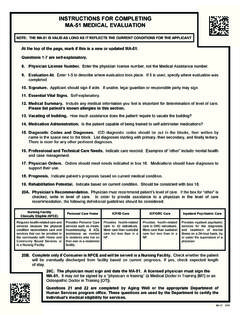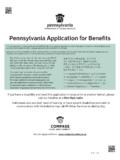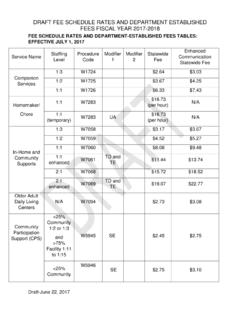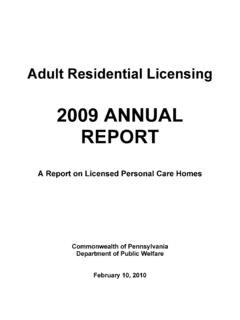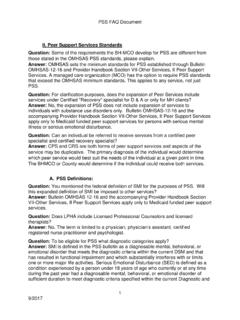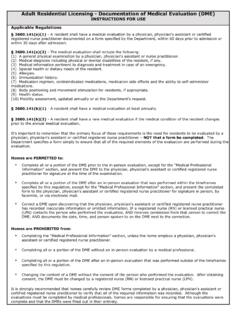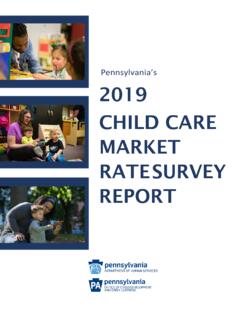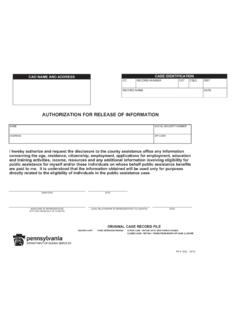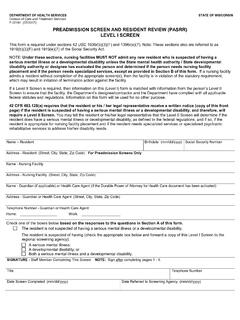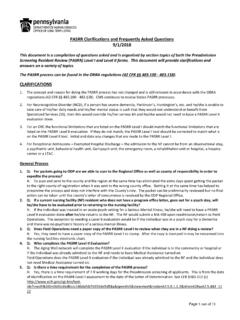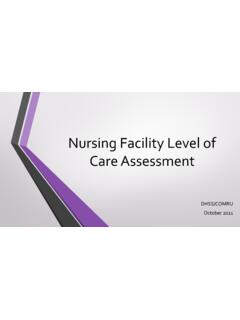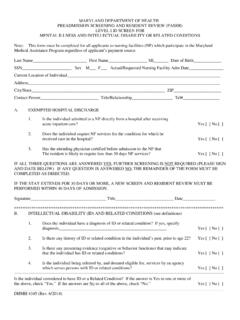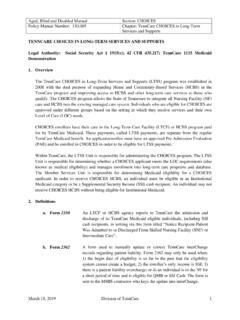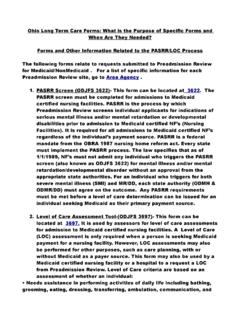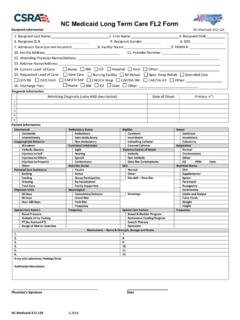Transcription of PENNSYLVANIA PREADMISSION SCREENING RESIDENT …
1 MA 376 11/18 Page 1 of 9 PENNSYLVANIA PREADMISSION SCREENING RESIDENT REVIEW ( pasrr ) IDENTIFICATION LEVEL I FORM (Revised 9/1/2018)This process applies to all nursing facility (NF) applicants, regardless of payer source. All current NF residents must have the appropriate form(s) on his/her record. The PREADMISSION SCREENING RESIDENT Review ( pasrr ) Level I identification form and pasrr Level II evaluation form, if necessary, must be completed prior to admission as per Federal pasrr Regulations 42 CFR NOTE: FAILURE TO TIMELY COMPLETE THE pasrr PROCESS WILL RESULT IN FORFEITURE OF MEDICAID REIMBURSEMENT TO THE NF DURING PERIOD OF NON-COMPLIANCE IN ACCORDANCE WITH FEDERAL pasrr REGULATIONS 42 CFR I DEMOGRAPHICS DATE THE FORM IS COMPLETED: SOCIAL SECURITY NUMBER (all 9 digits).
2 APPLICANT/ RESIDENT NAME - LAST, FIRST: CommunicationDoes the applicant/ RESIDENT require assistance with communication, such as an interpreter or other accommodation, to participate in or understand the pasrr process? NO YES Section II NEUROCOGNITIVE DISORDER (NCD)/DEMENTIAFor Neurocognitive Disorders ( Alzheimer s disease, Traumatic Brain Injury, Huntington s, etc.), the primary clinical deficit is in cognitive function, and it represents a decline from a previously attained level of functioning. Neurocognitive disorders can affect memory, attention, learning, language, perception and social cognition.
3 They interfere significantly with a person s everyday independence in Major Neurocognitive Disorder, but not so in Minor Neurocognitive Disorder. the individual have a diagnosis of a Mild or Major NCD? NO Skip to Section III YES the psychiatrist/physician indicated the level of NCD? NO YES indicate the level: Mild there corroborative testing or other information available to verify the presence or progression of the NCD? NO YES indicate what testing or other information: NCD/Dementia Work up Comprehensive Mental Status Exam Other (Specify): NOTE: A DIAGNOSIS OF MILD NCD WILL NOT AUTOMATICALLY EXCLUDE AN INDIVIDUAL FROM A pasrr LEVEL II 376 11/18 Page 2 of 9 Section III MENTAL HEALTH (MH) Serious Mental Illness diagnoses may include.
4 Schizophrenia, Schizoaffective Disorder, Delusional Disorder, Psychotic Disorder, Personality Disorder, Panic or Other Severe Anxiety Disorder, Somatic Symptom Disorder, Bipolar Disorder, Depressive Disorder, or another mental disorder that may lead to chronic RELATED the individual have a mental health condition or suspected mental health condition, other than Dementia, that may leadto a chronic disability? NO YES List Mental Health Diagnosis(es): related the individual have a diagnosis of a substance related disorder, documented by a physician, within the last twoyears?
5 NO the substance(s) the need for NF placement associated with this diagnosis? NO YES UNKNOWNIII-B RECENT TREATMENTS/HISTORY: The treatment history for the mental disorder indicates that the individual hasexperienced at least one of the following:A YES TO ANY QUESTION IN SECTION III-B WILL REQUIRE A pasrr LEVEL II EVALUATION BE COMPLETED. Health Services (check all that apply) in an acute psychiatric hospital at least once in the past 2 years: NO YES Indicate name of hospital and date(s): in a partial psychiatric program (Day Treatment Program) at least once in the past 2 years: NO YES Indicate name of program and date(s): admission to a state hospital: NO YES Indicate name of hospital and date(s): stay in a Long-Term Structured Residence (LTSR) in the past 2 years.
6 A LTSR is a highly structured therapeutic residential mental health treatment facility designed to serve persons18 years of age or older who are eligible for hospitalization but who can receive adequate care in an LTSR. Admissionmay occur voluntarily. NO YES Indicate name of LTSR and date(s): e. Electroconvulsive Therapy (ECT) for the Mental Health Condition within the past 2 years: NO YES Date(s): Name SS# (last 4 digits): MA 376 11/18 Page 3 of the individual have a Mental Health Case Manager (Intensive Case Manager (ICM), Blended or Targeted CaseManager, Resource Coordinator (RC), Community Treatment Team (CTT) or Assertive Community Treatment (ACT))?
7 NO YES Indicate Name, Agency, and Telephone Number of Mental Health Case Manager:2. Significant Life disruption due to a Mental Health ConditionExperienced an episode of significant disruption (may or may not have resulted in a 302 commitment) due to a Mental HealthCondition within the past 2 attempt or ideation with a plan: NO YES List Date(s) and Explain: intervention: NO YES Explain: of housing/Life change(s): NO YES Explain: : NO YES Explain: III-C LEVEL OF IMPAIRMENT: The mental disorder has resulted in functional limitations in major life activities that arenot appropriate for the individual s developmental stage.
8 An individual typically has at least one of the following characteristics on a continuing or intermittent CHECK IN ANY BOX IN SECTION III-C WILL REQUIRE A pasrr LEVEL II EVALUATION BE COMPLETED..1. Interpersonal functioning - The individual has serious difficulty interacting appropriately and communicatingeffectively with other individuals, has a possible history of altercations, evictions, firing, fear of strangers, avoidance of interpersonal relationships and social isolation..2. Concentration, persistence and pace - The individual has serious difficulty in sustaining focused attention for along enough period to permit the completion of tasks commonly found in work settings, or in work-like structured activities occurring in school or home settings, manifests difficulties in concentration, is unable to complete simple tasks within an established time period, makes frequent errors, or requires assistance in the completion of these tasks.
9 3. Adaptation to change - The individual has serious difficulty adapting to typical changes in circumstancesassociated with work, school, family, or social interaction; manifests agitation, exacerbated signs and symptoms associated with the illness; or withdrawal from the situation; or requires intervention by the mental health or Judicial : A pasrr LEVEL II EVALUATION MUST BE COMPLETED BY AGING WELL OR OLTL FIELD OPERATIONS (FOR A CHANGE IN CONDITION IN A NURSING FACILITY) AND FORWARDED TO THE OMHSAS PROGRAM OFFICE FOR FINAL DETERMINATION IF THE INDIVIDUAL HAS A YES IN ANY OF SECTION III-B AND/OR III-C AS A RESULT OF A CONFIRMED OR SUSPECTED MENTAL HEALTH SS# (last 4 digits).
10 MA 376 11/18 Page 4 of 9 Section IV INTELLECTUAL DISABILITY/DEVELOPMENTAL DISABILITY (ID/DD)An individual is considered to have evidence of an intellectual disability/developmental disability if they have a diagnosis of ID/DD and/or have received services from an ID/DD agency in the past. IV-A Does the individual have current evidence of an ID/DD or ID/DD diagnosis (mild, moderate, severe or profound)? NO Skip to IV-C YES List diagnosis(es) or evidence: IV-B Did this condition occur prior to age 18? NO YES CANNOT DETERMINEIV-C Is there a history of a severe, chronic disability that is attributable to a condition other than a mental health condition thatcould result in impairment of functioning in general intellectual and adaptive behavior?
